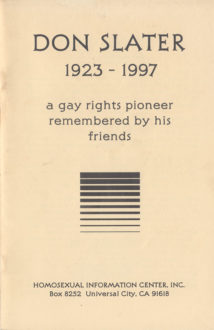 Soldiering On
Soldiering On
by William Edward “Billy” Glover
Don Slater:
a gay rights pioneer remembered by his friends
©1997 by Homosexual Information Center, Inc.
Jim Schneider, Chairman
Pp. 29–30
Second Printing, revised
Assembled, edited, and composed by Joseph Hansen
Laguna Beach, CA
After graduating from Louisiana State University in 1955, I joined the Army, hoping they would send me to Europe. They sent me first to Fort Chaffee, Arkansas for eight weeks basic training, radio school, which I flunked out of, and clerk-typist school, which I passed, since I’d taken typing in high school. Ft. Riley, Kansas, came next, and my hopes ran high. This was the home of the 10th Infantry Division, due to be sent to Germany. But I got shunted to Company headquarters at Ft. Benjamin Harrison, and was stuck there until my time had almost run out.
I was upset, got stopped for speeding on Post, then was called in and told I had been accused of being homosexual. Somebody had seen me parked with another young man in my wild, red, black and white Pontiac convertible. I never admitted I was homosexual, but they kicked me out anyway. And it was true, I had been sexually very active.
I threw away everything that connected me to the Army, left my controversial convertible at the house in Bossier City, got on a train in Shreveport, and made straight for L.A. I’d seen it on a family trip a few years earlier and fallen in love with it. An assortment of jobs based on my army training in money management followed, and I ended [up] at a branch office in San Francisco of one of these firms. That didn’t prove out. But the city did. I lived with Hal Call and worked for Mattachine for a time, then returned to L.A.
I soon found ONE, and before long was put on the staff at $50 a week. From addressing envelopes to toting the printed magazines to the postoffice for mailing, I did whatever they asked me to, cheerfully. I had no gay agenda of my own, but I kept my mouth shut and my ears open, and learned from Bill Lambert and from Don. I privately thought Lambert ought to shave more carefully, and worried about the bare-board library floor. Finally I decided our fortunes would improve if it were painted. All I could afford was some cheap red paint and that’s what I used. Nobody even noticed.
Lambert had pretensions to scholarship and taught classes in such subjects as sociology. He also started what he styled a scholarly journal on homosexuality, the One Institute Quarterly. After the move from Hill Street to Venice Boulevard, his attempts to bring the organization under his sole control began to cause conflict. A gesture of stepping down from the magazine was meant to disarm everyone, but didn’t work for long. Soon he saw Don and his editors as a threat. A night of the long knives followed.
What came next has been told already in these pages, but not enough credit has been given to John Cybulski, a truck-driver friend of Don’s, and a veteran of the Polish underground against the Nazis in World War II. John planned the entire physical move, down to tagging with a number every item to be transferred from the old to the new offices. It is typical of Bill Lambert, who felt himself above noticing the humdrum comings and goings of underlings, that he saw and suspected nothing.
I hadn’t seen this at first, but while both Bill Lambert and Don Slater were intelligent, Don was the better thinker. In fact, of all the people in the gay rights movement I ever met, Don was the only real thinker. The motives of all of them were noble, but Don had the patience the others lacked, to analyze and research before taking a position and going into action. He spent a lot of time in law libraries.
He knew what he was doing. The first, best example of this is the success of ONE magazine against all odds. To read most of the alleged histories of the gay movement, you’d think first came Mattachine, then came Stonewall. But in fact ONE Magazine was the first national outreach to the gay community. It was sold on newsstands in all major cities, and had subscribers in every state. Don, however he disliked the glare of publicity, also appeared on radio talk shows, sometimes with viciously anti-gay hosts; his motorcade protesting the anti-gay stance of the U.S. Military drew national attention, including a story in the New York Times.
Nor did he ever claim that it was gays alone who had accomplished his aims. He gave full credit always to the many straights who helped along the way, lawyers, academics, journalists, radio and TV people, printers, landlords, magazine dealers, the list is long and he wanted the credit to go where it was due. He was always fair, always honest, always true to his beliefs. If he had mastered the art of hype, he’d be famous today. But he despised the art of hype. I was Don Slater’s sidekick for most of my life, and I miss him terribly. Besides being a great man, he was a wonderful, warm friend. I hope his ideals will never die.
©1997, 2017 by The Tangent Group. All rights reserved.
The HIC is grateful to Stephen Brzoska for his help in digitizing this text.

